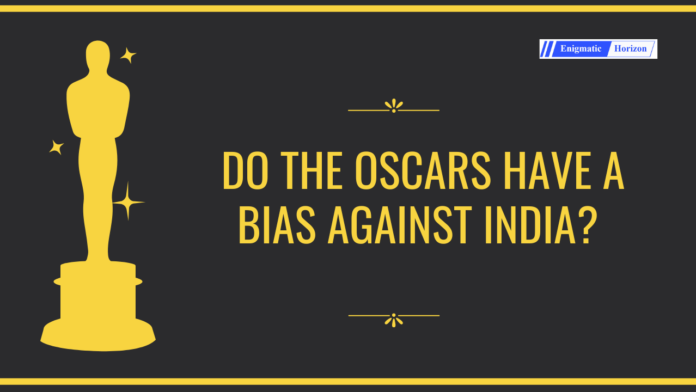The Oscars, commonly known as the Academy Awards, are frequently cited as the highest honor in the movie business. Although the Academy aims to recognize cinematic brilliance from all over the world, there has been an ongoing discussion about prejudice toward Indian cinema. Indian cinema is well known for its dynamic narrative, rich cultural legacy, and influence on people all over the world. What might be the cause of this startling parity? Given that India consistently produces a large number of critically praised films, it is hard to believe that it is the quality. So, below we discuss a few reasons listed that might be the cause:
Historical Perspective:
India is the world’s largest producer of movies, with a thriving industry that cranks out an incredible number of films. Indian cinema has not constantly earned the proper acknowledgment at the Academy Awards, despite its considerable influence.
When the historical backdrop is assessed, it is clear that Indian films had to overcome several obstacles to receive Academy recognition. Up until 1957, technical issues with the selection procedure prevented India from having its entry for Best Foreign Language Film recognized. As a result, it was difficult for Indian movies to stand out on an international scale. This early omission created the impression that Indian cinema was being unfairly criticized.
Inadequate Marketing
Most people in India and beyond have never heard of the Films Federation of India that has been sending films for nomination to the Oscars. Whether they are from Bollywood or another film industry is irrelevant. Probably the enormous factor contributing to India’s lackluster performance at the Oscars is bad promotion. The Federation might be sending films that are below average.
The Academy is made up of voters, as we all know. Some individuals must simultaneously watch movies while working in their respective vocations. Additionally, nobody has the time to see every film that a nation submits for review.
Language and Cultural Barriers:
The cultural and linguistic barriers between Indian films and the majority-English-speaking Academy voters should also be brought into account. The majority of Bollywood movies are produced in Hindi, which confines their accessibility to non-Hindi speakers. Additionally, cultural references and nuances in Indian movies could not always be understood by audiences outside of India, which could hurt those movies’ chances of winning nominations or awards.
The Indian film industry has advanced significantly at the Oscars, receiving nominations in the Best Foreign Language Film category and recently, an Indian film RRR won in the Best Original Song category, but Indian cinema has found it tough secure nominations in crucial categories like Best Picture or Best Director. This recognition difference has occasionally been attributed to the seeming bias towards India.
Diverse Perspectives:
Although the Oscars have come under fire for a perceived bias against Indian cinema, it is important to acknowledge the Academy’s efforts to support international cinema and the growing diversity of its membership. Films like Lagaan and Mother India got substantial Oscar nominations in the past, and this example may be used to show that when Indian films meet the Academy’s requirements, they are recognized and appreciated.
The selection and recognition of films are influenced by a wide range of circumstances, making the film industry fundamentally complex. Gaining nominations depends heavily on marketing, distribution, and screening accessibility. Hollywood has a strong network and infrastructure in this area, which gives it an edge over other film industries like Bollywood. These difficulties must be taken into account while talking about prejudice against Indian movies.
Thus, there are several facets to the issue of whether the Oscars favor Western countries over India. Even if there have been occasions that imply Indian cinema is not getting enough credit, this year we saw a change. Not only RRR, the period action-drama film which gained international popularity won an Oscar for the song Naatu Naatu, but another film The Elephant Whisperers also won in the category of Best Documentary. In addition to this, many Indian movies are gaining recognition as well as winning awards in international film festivals. Let us hope that in the future, quality Indian cinema continues to get the popularity it deserves.
